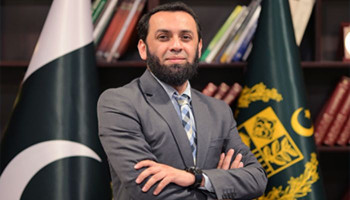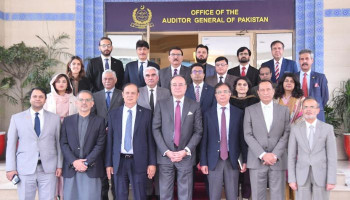
Technological progress has long advanced at a gradual pace across various aspects of life, yet each step forward has typically proven transformative — just as Benjamin Franklin’s invention of electricity. Similarly, the integration of artificial intelligence (AI) into healthcare has the potential to increase the daily number of patients treated and cared for, ushering in a new era of medical efficiency and accessibility.
These were the views expressed by Dr Adil Haider — Dean of Aga Khan University Medical College, Pakistani–American trauma surgeon, and public health researcher — at a panel discussion titled 'Breaking Barriers: AI, Access, and the Healthcare Crisis'. The event was hosted by the School of Tomorrow (SOT) and Beaconhouse National University (BNU) at Karachi’s Beach Luxury Hotel.
Joining Dr Haider were two esteemed panellists: Dr Nuzhat Faruqui, a distinguished Urologist at Aga Khan University Hospital (AKUH), and Dr Zehra Jamil, a senior instructor at AKUH's Department of Biological & Biomedical Sciences. Together, they explored the integration of AI in addressing Pakistan’s healthcare crisis, discussing whether AI would be a boon or a threat to the human workforce in healthcare.
Highlighting AI as a catalyst for enhanced and augmented healthcare services, Dr Haider explained that doctors, like any humans, can become exhausted after consulting many patients consecutively. An AI assistant integrated within hospitals' databases could be transformative, he argued, allowing doctors to focus better on direct patient care.
One of AI’s chief contributions to healthcare, he outlined, would be in reducing the time needed to review each patient’s records, allowing doctors more time to examine and engage with patients directly.
“Long queues outside hospital OPDs, dispensaries, and pharmacies are one of the most frightening reasons people fear visiting hospitals, and these are the least AI can address,” he stated.
In response, Dr Zehra Jamil elaborated that AI would enable doctors to devote more time to patients instead of sifting through lengthy records of past treatments. Specialising in malnourishment research, Dr Jamil shared her recent experience with AI-backed studies.
“As our research aimed to determine what kind of medical intervention would best support children with malnourishment, we were astonished to see the AI-predicted suggestions with 79% accuracy,” she said.
With a significant portion of Pakistan’s population being young, Dr Jamil emphasised that it is time to embrace AI for progress rather than seeing it as a replacement for healthcare workers, risking a depersonalised industry.
Reflecting on her mental health programme in Chitral following the 2016 earthquake, Dr Nuzhat Faruqui recounted the overwhelming number of patients and the challenges she encountered.
“Had we been accompanied by an AI assistant or some kind of robot, we would have treated a patient count manifold greater than what we achieved,” Faruqui said.
She noted that one of the greatest hurdles in Chitral was the language barrier, as most locals spoke only their native language, which hindered communication between patients and doctors. Addressing such gaps, the panellists agreed, would require government support and policies that prioritise AI integration in healthcare, making AI a standard practice across medical settings.
On this, Dr Haider remarked that culture must come before policy: Pakistan needs to cultivate a society that normalises AI, a goal achievable only through widespread AI literacy and awareness among the general population.
In their concluding remarks, the panellists agreed that incorporating AI into Pakistan’s healthcare system has the potential to improve patient outcomes and overall medical services. Through supportive government policies and a culture open to AI, Pakistan can leverage AI’s transformative impact on healthcare for the betterment of society.
















